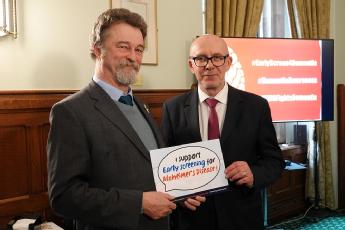WMG News - Latest news from WMG
WMG researchers present new Alzheimer’s widespread screening device at parliament
On Wednesday (24th April), WMG at the University of Warwick’s Professor Alan Chalmers, and his research team, held a parliamentary drop-in session, hosted by Sir Jeremy Wright, MP for Kenilworth & Southam and Vice-chair of the all-party parliamentary group on Dementia.
Scientists at WMG, have been working on ground-breaking medical screening for neurodegenerative conditions, with a particular focus on Alzheimer’s disease. The research is based on growing evidence that people suffering with such diseases can lose their sense of smell and taste, many years before other symptoms, such as memory loss, become apparent.
An early diagnosis is critical for those with the disease. New drug technology can slow the progress of Alzheimer’s, but only if detected early enough.
Together with research partners including the NHS, Neurosaliance, and Superlunary Labs, the scientists updated policy makers on the progress of a National Engagement Framework for facilitating screening across the county and demonstrated a new working prototype of their flavour perception testing system.
Matt Western, MP for Leamington and Warwick, said: “We should strive for equality in dementia diagnosis across the UK. It was great to meet Professor Chalmers and his team from WMG. They are working with Superlunary Labs to develop flavour perception technology, for wide-spread non-invasive screening, which could help us achieve that goal.”
The Framework was piloted last year and resulted in data being collected at a number of venues across the country facilitated by MP’s constituency offices.
The plan is for the easy-to-use, low-cost perception testing system to be deployed in pharmacies, care homes and GP surgeries across the country.
This will allow people to measure their own flavour perception ability without the need for a GP appointment. The results will be sent to GPs via a mobile app, and those who perform poorly can then be referred for further tests.
WMG’s Professor Alan Chalmers, who is leading the research said: “In this simple screening test, people are given different flavours to smell and taste. They then, for example, determine which is sweeter, less astringent or smells more of lemon. It’s an easy, non-invasive test which can be rolled out to people quickly right across the UK. It was great to have an opportunity to share our Framework with policy makers.
“At the moment, people who present with symptoms of memory are referred for MRI scans and spinal fluid tests to confirm a diagnosis. By the time memory loss occurs things are often too late; pioneering drug treatments only perform well in the early stages of degeneration. MRI scans and spinal fluid tests are currently not done before there is an indication of the disease as they are incredibly invasive, can cause distress and are expensive and time-consuming for the NHS. Failure of the flavour test can give the necessary early indication.”
Marcus Jones MP for Nuneaton, added: “It was wonderful to meet the team from WMG and Superlunary Labs working to develop flavour perception testing as a method of early screening for neurodegenerative conditions. Work like this is essential for tackling the growing problem of dementia in the UK.”
Read more about WMG’s Visualisation research here: Visualisation Group (warwick.ac.uk)

